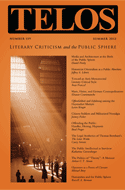Jeffrey S. Librett’s “Historicist Orientalism as a Public Absolute: on Herder’s Typo-teleology” appears in Telos 159 (Summer 2012). Read the full version online at the Telos Online website, or purchase a print copy of the issue here.
 After the Enlightenment attempted to replace the revealed public absolute with a self-grounding universal rationality, an attempt the Counterenlightenment charged with arbitrariness, the historicist discourse tried to establish the narrative of the origin and development of culture as a public, objective absolute that escapes this critique. In this narrative, the Orient functioned as a fetish of origin subserving the disavowal of the lack of grounding that the Enlightenment had introduced. In historicist Orientalism, the Occident appropriated this alien origin by applying the logic of medieval typology—hitherto the principal model for the supersession of Judaism by Christianity—to the Oriental-Occidental relation in general. Historicist Orientalism constituted a typological teleology to assert the supersession of East by West as a quasi-secularized, objective, public absolute. In the anxiety-inducing metaphysical void of modernity, the story of culture provided an “orientation” that revelation failed to deliver. Herder’s Ideas for a Philosophy of the History of Humanity (1784-91) was one of the most important inaugural instances of this historicist Orientalism in the German tradition. The essay retraces the outlines of the problematic logic through which Herder recounted the passage from the origins of culture in Asia to their Western appropriation. Situating the Jews as the realization of the Oriental prefiguration, Herder’s discourse provides an exemplary version of the passage from the Judaeo-Christian application of typology to its Orientalist generalization and secularization.
After the Enlightenment attempted to replace the revealed public absolute with a self-grounding universal rationality, an attempt the Counterenlightenment charged with arbitrariness, the historicist discourse tried to establish the narrative of the origin and development of culture as a public, objective absolute that escapes this critique. In this narrative, the Orient functioned as a fetish of origin subserving the disavowal of the lack of grounding that the Enlightenment had introduced. In historicist Orientalism, the Occident appropriated this alien origin by applying the logic of medieval typology—hitherto the principal model for the supersession of Judaism by Christianity—to the Oriental-Occidental relation in general. Historicist Orientalism constituted a typological teleology to assert the supersession of East by West as a quasi-secularized, objective, public absolute. In the anxiety-inducing metaphysical void of modernity, the story of culture provided an “orientation” that revelation failed to deliver. Herder’s Ideas for a Philosophy of the History of Humanity (1784-91) was one of the most important inaugural instances of this historicist Orientalism in the German tradition. The essay retraces the outlines of the problematic logic through which Herder recounted the passage from the origins of culture in Asia to their Western appropriation. Situating the Jews as the realization of the Oriental prefiguration, Herder’s discourse provides an exemplary version of the passage from the Judaeo-Christian application of typology to its Orientalist generalization and secularization.


